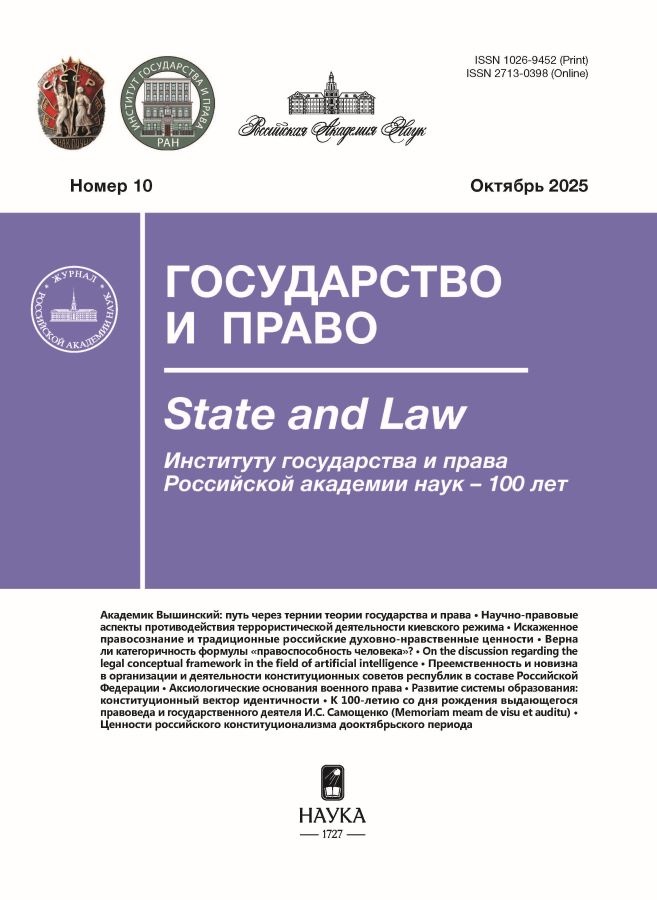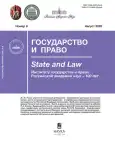Кодификация международного частного права Франции: эволюция коллизионного регулирования
- Авторы: Ерпылева Н.Ю.1, Гетьман-Павлова И.В.1, Касаткина А.С.1
-
Учреждения:
- Высшая школа экономики
- Выпуск: № 8 (2025)
- Страницы: 138-153
- Раздел: Право и международные отношения
- URL: https://modernonco.orscience.ru/1026-9452/article/view/689790
- DOI: https://doi.org/10.31857/S1026945225080141
- ID: 689790
Цитировать
Полный текст
Аннотация
В марте 2022 г. был опубликован проект Кодекса международного частного права Франции. Этот проект представляет собой огромное событие не только для Франции, но и для всего мирового юридического сообщества. Если Кодекс будет принят, его вступление в силу кардинально изменит французское международное частное право и окажет серьезное влияние на дальнейшее развитие кодификационных процессов как в других европейских странах, так и в рамках Европейского Союза в целом. Цель настоящей статьи – ознакомить российского читателя с историей кодификации международного частного права Франции, с общей концепцией и структурой проекта 2022 г., акцентируя особое внимание на принципиальной новации в оценке характера коллизионных норм. В современной французской практике коллизионные нормы имеют факультативный характер (кроме норм, определяющих компетентное право по вопросам личного статуса и правоспособности) и применяются судьями по собственному усмотрению. В проекте записывается императивный характер коллизионных норм – судья обязан их применять во всех ситуациях, когда спор затрагивает сферу международного частного права. Проект в целом представляет собой полномасштабную комплексную автономную кодификацию международного частного права, выстроенную по классической «триаде Чешира»: определение компетентной юрисдикции – определение компетентного права – признание и исполнение иностранных решений. При этом структура проекта не является ригидной, а учитывает особое место общих положений международного частного права и обеспечительных мер. Объем проекта составляет 207 статей, превышая, таким образом, действующие национальные кодификации в других странах. Поставленные в исследовании задачи решаются с помощью проверенной юридической методологии – с использованием исторического, формально-логического и сравнительно-правового методов. Сделан вывод, что, несмотря на активные универсальные и региональные процессы унификации международного частного права, его национальное измерение не утрачивает своих позиций, и национальная кодификация международного частного права остается востребованной и актуальной. К сожалению, через три года после опубликования проекта о его движении нет официальных данных, и существует вероятность, что его судьба будет повторением судьбы трех предшествующих проектов кодификации французского международного частного права.
Полный текст
Об авторах
Наталия Юрьевна Ерпылева
Высшая школа экономики
Автор, ответственный за переписку.
Email: natasha.erpyleva@rambler.ru
доктор юридических наук, профессор, руководитель департамента правового регулирования бизнеса факультета права
Россия, 101000, Москва, ул. Мясницкая, 20Ирина Викторовна Гетьман-Павлова
Высшая школа экономики
Email: getmanpav@mail.ru
кандидат юридических наук, доцент департамента правового регулирования бизнеса факультета права
Россия, 101000, Москва, ул. Мясницкая, 20Александра Сергеевна Касаткина
Высшая школа экономики
Email: akasatkina@hse.ru
кандидат юридических наук, доцент департамента правового регулирования бизнеса факультета права
Россия, 101000, Москва, ул. Мясницкая, 20Список литературы
- Левенсон П. Наследницы русского откупщика перед парижским судом. Дело г-ж: Вуич, Гарфункель и Рабинович // Журнал Гражданского и Уголовного Права. 1879. Кн. 3 (Май – Июнь). С. 37–62.
- Тариканов Д. В. Иностранные судебные решения о личном статусе во французском правопорядке // Закон. 2022. № 11. С. 189.
- Тариканов Д. В. Метод процедурного признания как антипод коллизионного метода в международном частном праве // Междунар. публичное и частное право. 2022. № 6. С. 25–29.
- Ancel B. Histoire du droit international privé. Paris, 2008. Pp. 10, 54.
- Billarant S. The French Diptych on Foreign Law: An Analysis through Its Most Recent Retouching // Yearbook оf Private International Law. 2006. Vol. VIII. Pp. 219–221.
- Clavel S., Saclay P. Projet de code de DIP [Electronic resource]. Available at URL: https://www.dalloz-actualite.fr/dossier/projet-de-code-de-dip (дата обращения: 15.05.2025).
- Corneloup S. France – The Evolving Balance Between the Judge and the Parties in France / Y. Nishitani (еd.) Treatment of Foreign Law – Dynamics towards Convergence? (Ius Comparatum – Global Studies in Comparative Law Series, 26). Springer International Publishing, 2017. Рp. 162, 163, 165–168.
- Débats parlementaires: Questions – Réponses Assemblée nationale // Nationale journal officiel de la République Française. 2024. No. 5 A.N. (Q). P. 148 [Electronic resource]. Available at URL: https://www2.assemblee-nationale.fr/static/16/questions/jo/jo_anq_202405.pdf (дата обращения: 15.05.2025).
- Delaume G. R. A Codification of French Private International Law // Canadian Bar Review. 1951. No. 29. Pp. 723, 733, 748.
- Desserre A. Le projet de Code de droit international privé passé à la loupe. 03/01/2024 [Electronic resource]. Available at URL: https://www.jss.fr/article-m.awp? P14097 (дата обращения: 15.05.2025).
- Fallon M. Les règles générales sur le droit applicable du projet de code à la lumière de l’expérience du code Belge // Clavel S. Projet de code de droit international privé: Effets des jugements et des actes publics étrangers. Travaux du Comité français de droit international privé, 2020–2022. Paris, 2023.
- Foussard D., Niboyet M.-L., Nourissat C. Réflexions méthodologiques sur le projet de code de droit international privé // Revue critique de droit international privé. 2022. No. 3. Pp. 479, 482, 491, 492, 495.
- Gasté J. Le droit patrimonial de la famille / Clavel S. Projet de code de droit international privé: Effets des jugements et des actes publics étrangers. Travaux du Comité français de droit international privé, 2020–2022. Paris, 2023.
- Glenn H. P. Harmonization of Law, Foreign Law and Private International Law // European Review of Private Law. 1993. Vol. 1. P. 59.
- Guillemard S., Prujiner A. La codification internationale du droit international privé: un échec? // Les Cahiers de droit. 2005. Vol. 46 (1–2). Рp. 175–192.
- Hausmann R. Pleading and Proof of Foreign Law – a Comparative Analysis // The European Legal Forum. 2008. No. 1. P. 4–6.
- Jourdan-Marques J. Projet de code de DIP et arbitrage: in or out? [Electronic resource]. Available at URL: https://www.dalloz-actualite.fr/node/projet-de-code-de-dip-et-arbitrage-iin-or-out-i (дата обращения: 15.05.2025).
- Lagarde P. Quelques remarques sur le projet de codification du droit international privé français // Revue critique de droit international privé. 2022. No. 3. Pp. 516, 517, 519.
- Leible S., Wilke F.-M. Le Projet de Code de Droit International Privé – A View from Germany // Revue critique de droit international privé. 2022. No. 3. Pp. 506– 509, 511, 512.
- Loussouarn Y. The French Draft on Private International Law and the French Conference on Codification of Private International Law // The International and Comparative Law Quarterly. 1956. Vol. 5. No. 3. Р. 393.
- Nadelmann K. H., von Mehren A. T. A French Draft of a Law on Private International Law // The American Journal of Comparative Law. 1970. Vol. 18. No. 3. Рp. 614, 617–622.
- Remy B. Les codifications récentes du droit international privé // Revue internationale de droit comparé. 2010. No. 2. Рp. 291–295.
- Yöney C. Mart 2022 Tarihli Fransız Milletlerarası Özel Hukuk Kanunu Tasarısının Genel Hükümlerine Dair Bazı Tespitler // Sakarya Üniversitesi Hukuk Fakültesi Dergisi. 2024. No. 12(2). Pp. 993, 1000, 1001.
Дополнительные файлы








